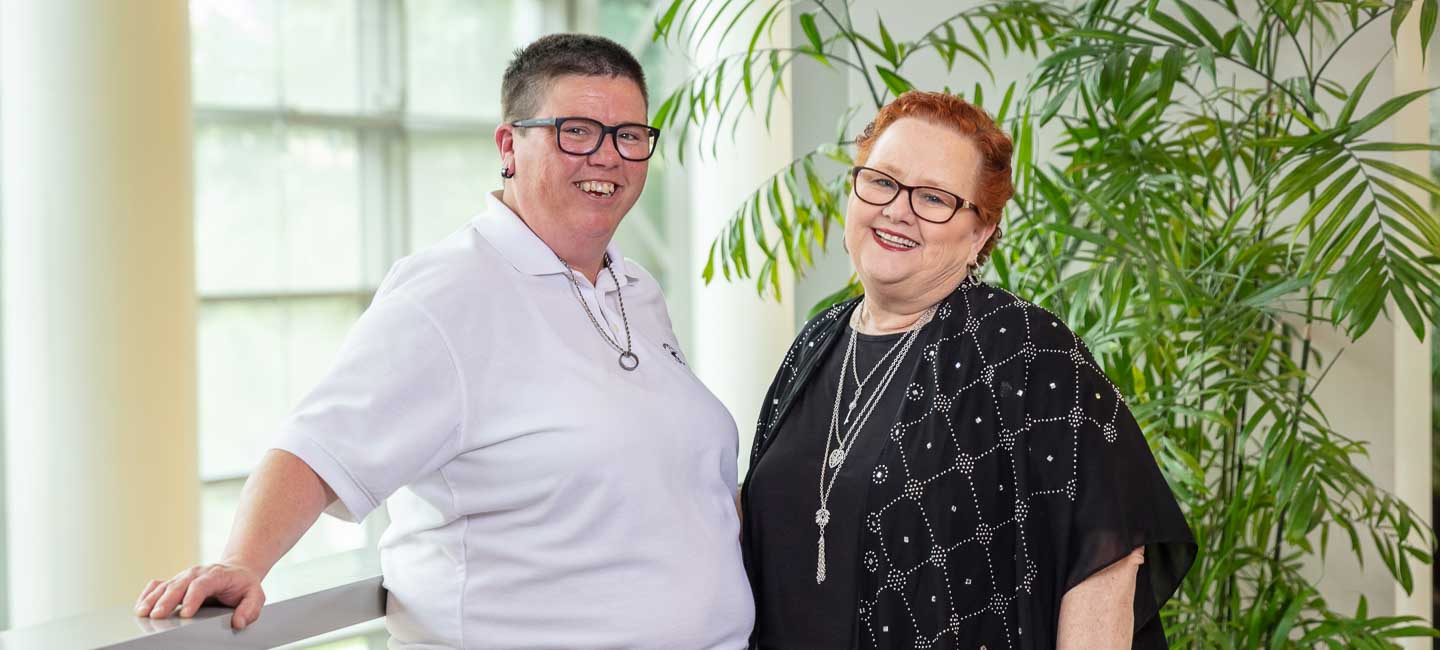Moffitt Named Leader in Healthcare Equality
For more than 20 years, Wanda Lane saw Moffitt Cancer Center as a team member. But in 2017 her perspective changed when she was diagnosed with multiple myeloma.
First, she told her wife, Marcy Devlin, of the news. Since Devlin also works at Moffitt, Lane was able to tell her about the test results in a conference room away from the eyes and ears of team members and patients. But when she did share her diagnosis, she said her co-workers reacted just as she expected: with full support.
“Moffitt is like a family and from the moment I told my wife about my multiple myeloma diagnosis in 2017, Moffitt embraced us both professionally and personally,” she recalled.
While Lane leaned on her wife for support, she also found encouragement from her fellow Moffitt team members. As she prepared for her treatment and the expected absence from work required following a stem cell transplant, Lane learned that co-workers donated nearly 400 hours of PTO to her.
“That was just amazing,” Lane said. “It meant so much and it just solidified what I have always thought about the people here at Moffitt. They celebrated our wedding with us and they came together to support us during the most difficult time in our lives. It means so much. They are our family.”
This summer, Moffitt was recognized as an LGBTQ Healthcare Equality Leader by the Human Rights Campaign Foundation/HRC. The cancer center scored a 100 on the Healthcare Equality Index (HEI) survey. This year’s survey included a higher benchmark, requiring participating facilities to demonstrate that they offered at least one company-wide health insurance plan that affirmatively provides transgender-inclusive coverage in order to earn the top score of 100.
The Human Rights Campaign Foundation/HRC is the educational arm of America's largest civil rights organization working to achieve equality for lesbian, gay, bisexual, transgender and queer people. HRC envisions a world where LGBTQ people are embraced as full members of society at home, at work and in every community. This is the eighth year in a row that Moffitt earned a place on the list.
“To have this designation for eight years in a row speaks volumes. It speaks to the fact that Moffitt takes great pride in its commitment to diversity and inclusion. This recognition again emphasizes our ongoing dedication to ensuring LGBTQ patients and team members have the best access to care,” said B. Lee Green, Ph.D., vice president of Diversity, Public Relations and Strategic Communications at Moffitt. “Every community is at risk for cancer and it is our mission to contribute to the prevention and cure of cancer regardless of who the patient loves or how they identify.”
For patient Lexx Howe, Moffitt’s diversity policies and acceptance of the LGBTQ community made his treatment as comfortable as it could be when he battled sarcoma in 2014.
“Moffitt saved my leg and my life,” Howe said. “The doctors and nurses made me as comfortable as possible and never had any issue with my partner visiting me or any others from my community. I always felt welcome.”
When Howe shared that he performed drag locally, many of his nurses asked for photos and have since seen him perform. While his cancer is in remission, he still visits Moffitt regularly and participates in LGBTQ-focused programs and readily shares his story.
Lane, who recently celebrated her 26th anniversary at the cancer center, said that experiences like hers and Howe’s are what make Moffitt such a special place for all patients, including those from the LGBTQ community.
“Even if I didn’t work here, I wouldn’t want to be treated anywhere else,” Lane said. “I just get the added benefit of calling my doctors my co-workers.”
The Healthcare Equality Index is the national LGBTQ benchmarking tool that evaluates health care facilities’ policies and practices related to the equity and inclusion of their LGBTQ patients, visitors and employees. The index is based on four criteria:
- Non-Discrimination and Staff Training
- Patient Services and Support Employee Benefits and Policies
- Patient and Community Engagement
- Employment Nondiscrimination.



